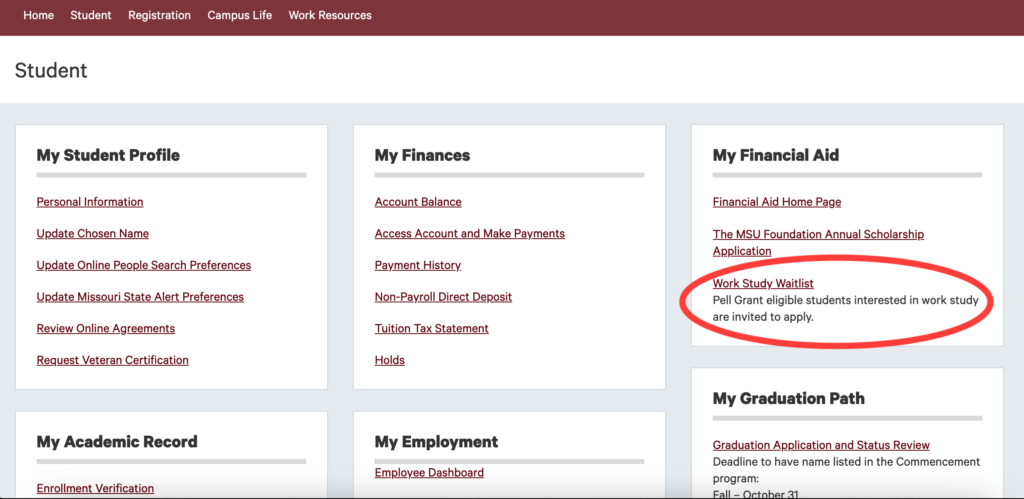Have you ever heard the term “Work-Study” thrown around by classmates or friends? Have you ever wondered what it is or how it works? Well, we’re going to clear up any confusion regarding the work-study program today!
Quick View:
- If you qualify for the Pell Grant, you likely qualify for the Work-Study program.
- You can use our federal Work-Study calculator below to see how many hours per week you can work.
- The Work-Study Waitlist opens on August 1st at 7:00 am. The waitlist works on a first-come, first-serve basis.
For more information, Keep reading…
What is the Work-Study Program and Do I Qualify?
The Work-Study program is a method of funding for student employees. On-Campus Jobs, located on our website can require two different types of student status. “Work-Study required” or “Work-Study optional”. Anybody can apply to and land a Work-Study optional position. On the other hand, only people that qualify for the Work-Study program can apply to and land the Work-Study required positions. So, how do you know if you qualify for work-study you ask? There are a few requirements you must meet.
You must…
- Have filed a FAFSA for the current academic year, so that we can ensure there is a financial need that has not been met.
- You must be enrolled in at least 6 credit hours per semester in the Fall and Spring. During the summer you must be in a minimum of 3 credit hours.
- You must maintain a 2.0 GPA.
- Work-Study funds must be available, if they are unavailable at the time, you can sign up for our waitlist (see next section).
- Unfortunately, Graduate students and International students are not eligible for Work-Study.
Another good thing to note is that your Work-Study eligibility is determined by your financial need from your FAFSA results. Students who qualify for a Pell Grant may qualify for the Work-Study program. So, if you’re reading this to figure out if you qualify, check your financial aid records and if you have qualified for, or received a Pell Grant and fulfill all the requirements above, then you likely qualify for Work-Study! Work-study students are paid through federal funding that is allocated to the university. With all of that being said, it is important to know that the Work-Study program does not work as a grant or a loan but rather as a regular job. You will be paid for the hours you work each pay period. While it’s, of course, an option, you are not required to use your earned money towards your tuition. You can use your earnings in any way you need to. Food, housing, gas, books, those jeans you’ve had your eye on that are finally on sale!
Why Work-Study?
You may be asking yourself, “why do some positions require work-study qualified students, while others don’t?” That’s because some departments on-campus don’t have the budget to pay a student employee out of their own pockets, but they have plenty of work to go around. This is where work-study comes into play. Work-Study allows the department to hire student employees and pay them without going outside of their departmental budget constraints.
Let’s discuss the number of hours that Work-Study student employees are allowed to work. The student’s hours are limited by the amount of the work-study award and cannot exceed 1,000 hours in any given 12 month pay period. That means that depending on how much your work-study award is worth, you will be able to calculate how many hours a week you can work. You can find more information about this on our website but here is a simple breakdown.
To find out how many hours per week you can work to fully maximize your work-study funding, use the formula below.
Take the award amount and divide that by the number of weeks you plan on working during the academic year, and then divide that by your hourly pay rate. This will get you your allowable hours per week. Example below:
Award Amount: $3,500 Weeks to Work: 33 Pay Rate: $10.30
$3,500 / 33 Weeks / $10.30 = 10 hours per week
Work-Study Waitlist?
Have you heard of the ‘Work-Study Waitlist”? This is a question we often get in our office. If you qualify for work-study funding and you did not receive it on your financial aid awards, you can sign up for the work-study waiting list. The link to sign up is located on your My Missouri State menu under the financial aid section. Work-study waitlist funding is awarded on a first-come, first-serve basis as it becomes available. It’s important to take care of these items as soon as possible so that you can be near the top of the waitlist and get a job as soon as possible! The waitlist opens on August 1st at 7:00 am, if you qualify for Work-Study and want to get a job on-campus, be sure to be one of the first people to sign up for the waitlist. For more information about the Work-Study waitlist, visit our website! 
We hope this helped to clear up any confusion you had about the Work-Study program. We understand that it is a complicated system that not many students understand. We are always happy to help if you have questions. Feel free to visit our website, give us a call, or come by the office! (Shannon, room 113)

